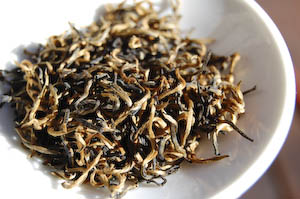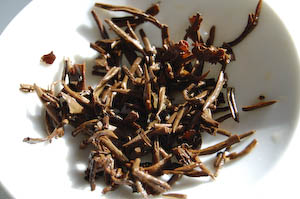What can one say about such a whimsically named tea? To begin, we may say that it is not the tea's true moniker. That honor lies with the Chinese words
Adagio has this to say of their tea -
Black tea from the Fujian province of China. Golden Monkey tea is hand-processed each spring with a careful plucking of only one leaf and one bud. It is among the finest Chinese black teas available today. The name comes from its unique appearance: the leaves resemble monkey claws. If you enjoy full-bodied teas with an abundance of flavor, we urge you to give this tea a try.
Appareance & Liquor: I've already complimented the Golden Monkey on it's apt appellation, and there's not much more to say for it's liquor. It is predictably dark, but not as murky as an Assam based blend, with a clearer tone and a deep tinge of pomegranate red. A good lesson in why the Chinese prefer to call what we call black teas, red teas.

Raw Aroma: The Golden Monkey's raw (and untamed) scent is perhaps my favorite part of this tea. It is completely unlike any other black (red) tea I've sampled before. Whereas others are true to a smoky, malty and fairly rough aromatic touch, the Golden Monkey is much earthier. It smacks of wet soil, rich fertile tea gardens and a natural humidity. More than a simple smell, the Golden Monkey interacts with the consumer. The fragrance elicits all the romantic imagery the tea market can conjure, from Peshawar colonials to the Chinese tea picker laboring in knee-high mist. Apocryphal? Maybe, but this is an incredible smell, and the tea hasn't even been steeped.
Steeped Aroma: All the magic of the raw leaf aroma carries over to the steeped aroma in mint condition, and perhaps with a little more clarity. Some of the earthy dustiness is lost in the hydration, but the notes of wet soil are sharper, clearer and more focused. Few teas can engage me so deeply with just the aroma. I find myself spending more time swooning over the fragrance then actually drinking tea. It also distracts me from my reading and work, which I almost always accompany with a serving of tea. In a way, the Golden Monkey is inimical to its intended design in my workflow, constantly harrying me with its robust aroma, but really, with an scent this rich and satisfying, I don't care.

Flavor & Palatte: Once again, the Golden Monkey excels as a black tea, complete with a cornucopia of strong and commanding flavors. Paired with an equally strong palate and the Golden Monkey makes for a well-flavored tea for any time of day or season. The earth and soil tones become far more palpable as they ripple across the tongue, practically booming with bulking and bass flavors. Heavy starch flavors (like potatoes and yams) are also present, shoring up a substantial body, though weaker than in some other black teas I've had. The palate is well matched to the flavor - thick and deep, though not unguent or oily. I'm enamored with the smoky and charcoal flavors as well. Though they pale in comparison to the taste of a heavily smoked Lapsang Souchong, the smoky infusion in Adagio's Golden Monkey makes a perfect spice and counter-balance to the relatively plain but rich earthiness.
The Golden Monkey was one of the very first teas to grossly outperform the stuff available on grocery shelves. In a way, it was the evangelizing agent, spreading the good word of tea to uncouth heathens like myself. That alone deserves merit, but even after sampling many excellent teas, the Golden Monkey remains one of my absolute favorites. Whenever a canister comes into my house it is voraciously consumed like it was a pizza at a LAN party. Absolutely a fine black tea, the Golden Monkey is the first tea I turn to when bringing another potential tea drinker into the fold. It is my holy book of tea, and without it I might not have started into tea at all.
3 comments:
Hi there,
I enjoyed your writing style and can full-heartedly relate to your notion of "evangelizing" friends to tea.
I might have misunderstood you, but I think you implied that the Chinese name for the Golden Monkey is Dan Cong. This is not correct, Golden Monkey is a congu (black tea) from Fujian Province, while Dan Cong is an oolong tea produced in Guangdong Province. In flavor, the two couldn't be more different. As you say, the Golden Monkey is very robust and strong. A quality Dan Cong on the other hand is wonderfully floral/fruity and quite light, indeed.
BTW, beautiful pictures...
Hello! I want to follow up on Jo's comment. Actually congou refers to black (red) tea in general. (It's a corruption of gong fu--same term as the martial arts--meaning "skill" or "effort" or "hard work".)
Golden Monkey's name in Chinese does indeed refer to monkeys--it's jin hou which means, literally, "gold monkey". So, this wonderful tea you've been drinking, jin hou, is one kind of congou.
Golden Monkey is, I agree, a great tea to introduce new tea lovers to the beverage. It's got a strong enough flavor for Western sensibilities, but enough complexity to wake people up and give them the "aha" moment... when they start doing what tea author James Norwood Pratt sometimes refers to as "thinking of tea in the plural." Tea isn't a single thing, it is many.
Golden Monkey is one of my favorites as well. I got some from Peet's long ago. Recently I've had more time to enjoy tea in the afternoon and this particular tea stands out for me among others that are quite fine in their own right.
Post a Comment